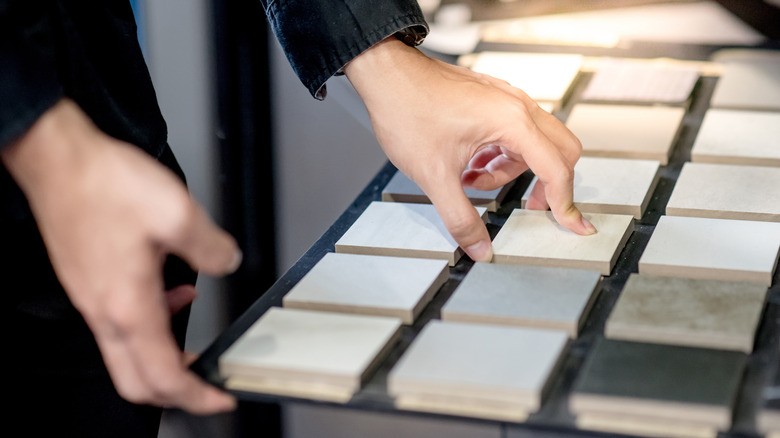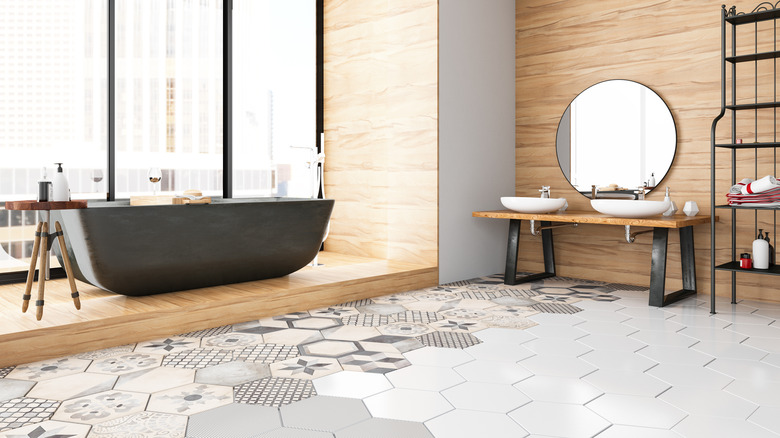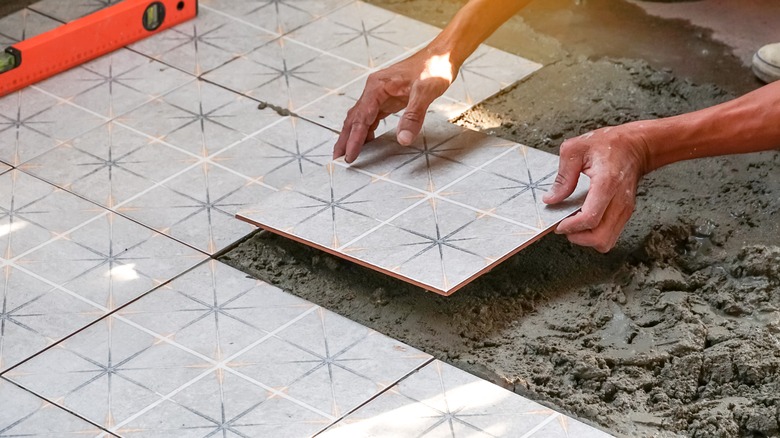The Flooring Material To Avoid Putting In The Bathroom, According To Our Tiling Expert
Most people will spend an average of one and a half years over their lifetime in their bathrooms. Whether this place is just a necessity you use when you have to, or you're part of the population who considers this room a place to get some alone time that you relish, that's a decent chunk of your life in this space. So when it comes to choosing the flooring you want for your bathroom, there's a lot to consider, which is why House Digest interviewed Schannon Yodice from That Tile Chick to find out what material you should avoid to make your decision a little easier. She recommends "avoiding any vinyl flooring that contains potentially harmful materials such as lead, cadmium, and VOCs." With so much time spent in this room, skipping over toxic flooring seems like a great idea.
When House Digest asked Yodice to give readers an exclusive interview on why they should avoid this material, she explained, "Since vinyl is a petroleum product made from PVC, it can potentially off gas VOCs." The good news is you can still find your vinyl flooring without the unwanted effects that some types feature. According to Yodice, you just need to do a little research. "Today, it is much easier to find non-toxic vinyl flooring by checking with the Resilient Floor Covering Institute (RFCI) for their safety certification," she suggests. "RFCI is independently owned and uses a scientific certification system to ensure unbiased testing."
Opt for ceramic or porcelain
Yodice notes there are several ways to know if your vinyl material is safe. "By making sure your flooring is manufactured in the USA or is Floorscore Certified you can ensure it will be non toxic." If you're still nervous about using this type of flooring in your bathroom, she gave House Digest her exclusive opinion on the best materials to use. "I will ALWAYS recommend porcelain or ceramic tile flooring," she said. Yodice explained, "Due to the fact that tile can be made out of recycled material, it's extremely durable and long lasting, and it does not facilitate mold growth; it is my top choice of flooring across the board."
The difference between porcelain and ceramic tile comes down to how each one is made, but installation also varies between the two. "Because tile is made from clay and other naturally-occurring minerals, it is free from formaldehyde, VOCs, and PVC resin all while obtaining durability and a huge range of choices in design and form," notes Yodice. This is why these options make such a great choice for people looking to fit their bathrooms with safe, effective materials that also look good. These tiles, while not completely waterproof, are also antimicrobial and inhospitable to various bacterias that lurk in moist areas, like a bathroom. They can get slippery when they come into contact with water, so look for textured ceramic or porcelain instead for a non-slip bathroom floor material.
The results of professional installation are worth the price tag
During her exclusive interview with House Digest, Yodice also explained that readers should consider durability and cost when purchasing your flooring. "When looking for the ideal flooring for your home consider the long term costs associated. Porcelain tile can be costly upfront but in the long run will outlast most any flooring with minimal maintenance." If it fits your budget, dropping the money for durable, well-built materials will keep your bathroom from incurring issues like mold, mildew, and water damage. You're also ensuring harmful ingredients aren't being introduced into your home.
There are always pros and cons to installing porcelain or ceramic in your bathroom, but the main drawback is tricky installation, which is not a big enough reason to pass up low-maintenance, stylish, sturdy floors. The tiles can get slippery when they come into contact with water, so for non-slip bathroom materials look for textured ceramic or porcelain instead. Yodice leaves readers with one last tip if they choose to try porcelain or ceramic flooring. "Always be sure to hire a qualified contractor to ensure a lasting installation," she notes. Professionals know how to handle these materials and do the work properly so you don't have any big issues down the line, and you can enjoy your bathroom for any amount of time you choose to spend in it!


